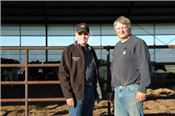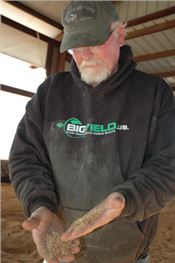|
SW Mo. Dairy And Creamery Sees Positive Changes With Pack Barns
MOUNTAIN GROVE, MO.
Brothers Dwight and David Fry remember the day that they decided to build bedded pack barns for their dairy cows.
They visited neighbor David Gray’s barns on a winter day when sleet was pounding down. “His cows were lying there in the barn chewing their cud and making milk,” said Dwight. “Ours were humped up and cold.”
Gray’s experience, coupled with information from University of Missouri Extension dairy specialist Ted Probert, convinced them that happy, healthy cows make more milk. Both brothers built a pack barn in 2016 with help from a cost-share grant from Natural Resources Conservation Service’s Environmental Quality Incentives Program.
Unlike conventional free-stall barns, bedded pack barns don’t have individual stalls or concrete alleyways. Bedding of fine sawdust causes fewer feet and leg injuries in cows than concrete or dirt floors, says Probert. Southwestern Missouri’s numerous sawmills offer an ample supply of cheap sawdust.
Fans provide ventilation and cool air. The barns tend to create less odor than other manure storage systems. Side curtains lower during rain, snow and windstorms for protection. The Frys designed their building with an east-west orientation for better breezes in summer. The animals can walk freely to nearby feeding, watering and grazing areas. They use less energy to find food and shelter in the winter, and they maintain better body condition as a result.
The Frys saw another critical benefit. Their cows’ somatic cell counts (SCC) dropped after moving to the new barns. Cows with high SCC produce lower-quality milk. Buyers pay a premium for milk with low SCC.
Another bonus is low-cost, high-nutrient fertilizer. More importantly, a natural fertilizer recycles the waste and sawdust from sawmills. The Frys spread compost from the barn on sorghum and wheat fields and disk it into the soil.
Yet another benefit is increased milk production. Results vary, but the Frys see as much as 10 more pounds per cow per day now. In summer, most cows produce less milk, but the Frys found consistent production after the change.
David and Dwight are third-generation dairy farmers. Their parents, Phillip and Dora Fry, purchased the current farm in 1957. Dwight has 105 cows and David has 70. They have two dairy barns with two feed floors, and the two pack barns. David’s 13-year-old daughter and Dwight’s two 16-year-old sons help with the evening milkings and feed calves in the morning and evening. The boys also help with planting and harvesting. Their older children pitch in as needed when they are home from college or able to take time off from their other jobs.
They opened Ozark Mountain Creamery in 2010, when the future of dairy looked questionable. The Frys took a chance and it paid off. “We needed more income and we decided to take the next step,” David said. The creamery supplies 6,000-7,000 half-gallon bottles of milk weekly to customers as far away as Joplin, St. Louis and Fayetteville, Ark. They sell excess milk to a dairy co-op, Central Equity. In addition to the brothers, the creamery employs five full-time and four part-time workers.
Happy cows raised in bedding pack barn make more milk. “It is one of the best things Missouri dairy farmers can do,” David said.
For more information, contact Probert at 417-547-7545 or probertt@missouri.edu, or dairy specialist Reagan Bluel at 417-847-3161 or bluelrj@missouri.edu. ∆

University of Missouri Extension specialist Ted Probert, left, says compost-bedded pack
barns provide many benefits for dairy cows. Dwight Fry, right, says one of the benefits
been reduced somatic cell counts, an indicator of higher milk quality.
Photo courtesy of Linda Geist

David Fry of Ozark Mountain Creamery shows the finely ground sawdust used in the
bedded pack barn. Southwestern Missouri's sawmills provide a steady supply of sawdust.
|
|